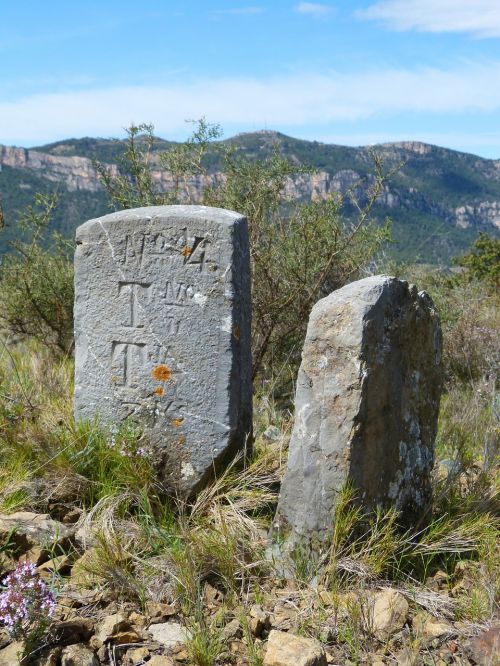Tag: Later Life
Get involved in developing a new ‘Life Transitions’ app – online workshop 25th May


Life Transitions Health App Workshop
There is an exciting opportunity to help develop and test a new Life Transitions App.
East Sussex County Council and the University of Leeds are working together on a new ‘Life Transitions Health App’ to help people prepare for significant changes in later life such as retiring, moving home, experiencing changes in health and mobility, becoming a carer, or experiencing a bereavement.
These changes can have a big impact on our lives and can be hard to manage – the Life Transitions Health App will help people to prepare ahead of time and be better equipped and supported when life changes happen.
They are looking for people in East Sussex and Leeds to be a part of this exciting new development that aims to improve the lives of older people.
You don’t need to be an expert on any ‘life transition’ – you just need be keen to be part of a new project and be someone who wants to play a part in improving people’s lives. Come and get involved, meet new people, share your experience and thoughts about life transitions, learn new skills, and help make a positive difference to people’s lives now and in the future.
There is an online workshop at 10am on Wednesday 25 May. If you are interested in participating please register HERE and please cascade amongst your networks.
If you have any questions about the project or joining details, please feel free to contact Sue Dunkley, Life Transitions Project Officer, from East Sussex County Council or Professor Arunangsu Chatterjee at Leeds University.
‘Over the Hill or Embracing the View?’ Perspectives on Later Life – Pippa Bonner


Pippa Bonner shares insights from her encounters as a Pastoral Worker with older people.
Adapted from a talk given by Pippa at our event on 26th April 2022 at Wheeler Hall, Leeds.
I am an older person (a younger older person, rather than an older, older person,) and a Catholic who retired a few years ago only to hear about a part time job in pastoral care. Now I work offering pastoral care to older women in a Nursing and Care Home. I am a widow with children and grandchildren. I come from a social work background, then moving to hospice work where I coordinated a Bereavement Service. At the same time I worked for a part time Masters Degree in Theology.
You might also like to know that I can knot balloons quickly, have a reasonable serve at tennis, and have found my singing voice improves with age. I dislike housework and gardening but love reading stories to my younger grandchildren.
There is nothing special in any of this because all older people gain experience in all sorts of ways, but I am ‘embracing the view’ of later life. However I have some hearing loss, cataracts and am being investigated for wobbly legs. All of these symptoms make me wonder, am I moving towards being ‘over the hill’ ?
What is special are some of the encounters I have had with older people, (older than me), which illustrate their faith, their wisdom, grace, courage and humour despite their losses, pain, vulnerability and, in some cases, dementia.
‘Models of Ageing’ and Unexpected Encounters
I have encountered great models of ageing as people patiently adjust to a new pain or a decrease in mobility. However, next day they may feel frustrated or anxious.
Older peoples’ situations can vary from day to day. I have learnt about encountering people in the moment and trying to respond in that moment. Some people like structure, planning and appointments, which I honour too, but others no longer do. They want to talk NOW.
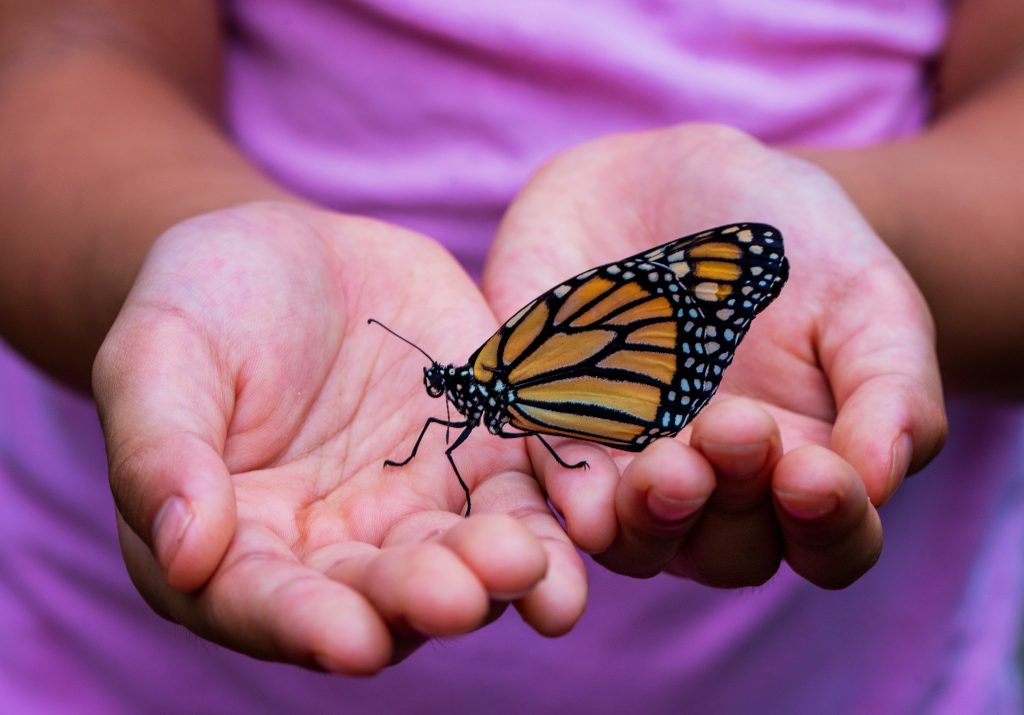

I find I often can respond in the moment.
Tomorrow, later in the day, the moment may have passed.
In my parish community I am encouraged and comforted by some of the parishioners in their 90s who come to Mass and other events. At least three who live alone near the church, walk to Mass using walking frames or sticks. Priests and people come and go but these three represent for me the faith, love, humour, highs and lows, and gritty persistence in the life of the Parish. I know they have bad days too, but they are an inspiration. We all know people like these: strong models of living life, however tough it is (who would be very embarrassed to be described like this!)
I also want to give a few examples that were unexpected gifts for me, of older, older people who may be viewed by some as being over the hill. But are they?
For example, one woman with dementia often has disturbing thoughts some of which are delusional and paranoid. It is distressing for her and those around her.
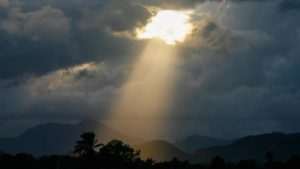

However, a while ago she said to me, in a clear moment, that when she gets wound up sometimes poetry helps her to unwind. So, I and others read poetry with her for short periods. Sometimes she reads familiar poetry she learned at school.
She also started to fear going out. On a lovely sunny spring afternoon recently, I took her out in a wheelchair. She pointed out to me the bird song and we enjoyed the flowers. We sang songs. One of them was “Row, row, row your boat “and I realised that the walking stick she insisted on clutching in the wheelchair had become the oar of our boat as we travelled past daffodils and even a butterfly in the March sunshine. She soon went back to feeling distressed but she had had some respite from her disturbing thoughts and we saw her transient enjoyment.
Another woman with dementia had lived a contemplative religious life for many years. At the end of her life she was mostly silent but had a wonderful smile. She was an example of one aspiration of older age: “being rather than doing”. Despite her dementia I and many others were aware of her deep spirituality.
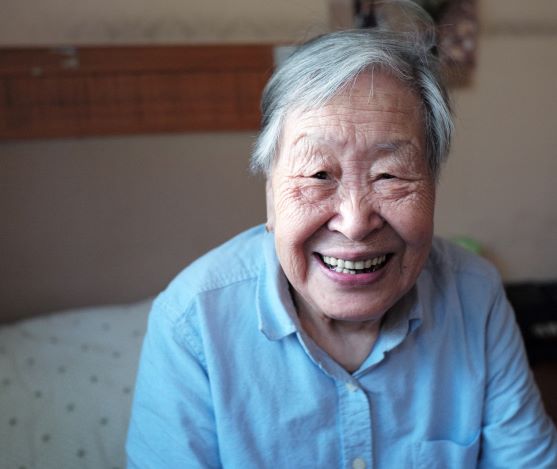

One of her favourite expressions before she lost most of her speech (though she would still sing) was “Oh, how lovely!” Sometimes, I would sit with her in silence, holding her hand. I felt so much strength coming from her. It restored me and seemed to comfort her as she smiled.
Similarly, another resident who had advanced dementia had been a very gifted teacher, writer and Spiritual Director. Part of my role in the Care Home is to facilitate a monthly Discussion Group. We were going to be discussing Pope Francis’ document, Laudato Si which is about the world and creation. I had gone with her around the garden.
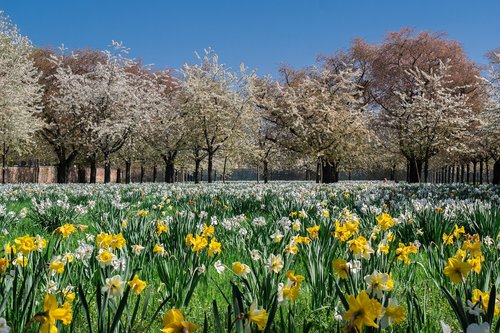

Suddenly she was praising the flowers and trees around her in a deep reflective, beautiful way. As soon as our walk was over, I wrote down what she had said and added it to the handout we were using. She came to the discussion and saw the piece she had said in the garden.
She joyfully read it aloud then and later in the session she read it again! Everyone was pleased to see a strong glimpse of the previous person they had known. Her joy and the pleasure of the other residents seeing her joy and a reminder of her work was a gift to all of us.
Embracing the View – with it’s beauty, light and dark patches
It goes without saying that I have also encountered deep pain and distress in my pastoral work. Older people may feel they are encountering numerous losses in their life: bereavement and other losses of health, independence and agency. For some older, older people their lives are punctuated by so many adjustments to new losses (not necessarily deaths), pain and changes in their daily lives that the process of finding some kind of equilibrium can be a recurring challenge.
People usually find that resilience means
not blocking out the emotional pain, but living with it,
and in time, finding altered ways of living.
All of us can listen, support and accompany people at particular times. Compassion is literally about staying “with the passion”, the passing or pain, of the moment.
How can we continue to find hope, faith and perseverance? How can we embrace the view? Those of us who are older may have less physical strength but have life experience to know when we are managing, need some support or where we can continue to support others around us.
Ageing, whether as a younger older person or an older, older person, seems to mean adjusting to new ways of managing how we feel, how we cope and experience new hurdles and happy times, often all at once. We embrace the view with its beauty, light and its dark patches.
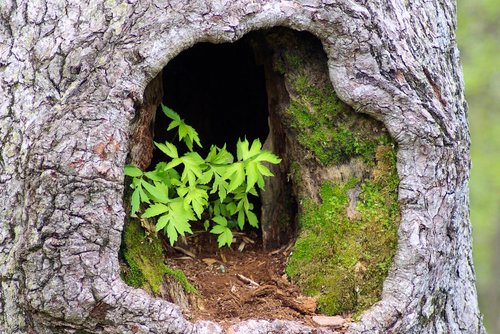

The Mass is an important part of many Catholics’ lives, particularly older Catholics. For many people with dementia, Mass remains important in some way. Often the words, rhythms, actions and hymns are recalled and people may join in for a time. One woman sometimes bursts into tears when the words of Jesus’ death are mentioned, but she can also become loudly ecstatic at the consecration. These are unfiltered, undiluted responses which teach us all to value what is happening. We should be grief stricken or ecstatic at the same moments, but repetition and an adult sense of decorum can get in the way.
Growing Old Grace-fully became aware during the Covid lockdown how some older people preferred watching Mass or other church services online. People could choose a priest or church or time that suited them, and could participate from a comfortable, familiar armchair rather than journey to church. Some could hear the homily better. Growing Old Grace-fully hope that some streamed Masses will continue.
So, are we or others embracing the view or over the hill? I think we can only answer for ourselves.
I have often noticed that people who society might deem
as being “over the hill”, appear to me as having moments
of great understanding, wisdom, joy and vision.
Pippa finished her talk by reciting this poem:
Taking Communion to Jennifer by Fr Michael McCarthy
From his collection of poems ‘The Bright Room’ published in 2018.
I find her in good form. We chat awhile, then move on to pray. As we make our way through the Our Father I sense a presence in the space behind me. Concentrating on the moment, I continue: Lord I am not worthy that you should enter Under my roof…As she receives the host A warm breath caresses the back of my neck. Turning, I see an elderly resident in slippers Her face stricken. A single sob escapes from her. Placing a hand on her forehead I say the blessing. Her full-on smile radiates down the length of my arm Something is unlocked in us.
Pippa Bonner, April 2022
‘Over the Hill or Embracing the View?’ Perspectives on Later Life – Helen Reid
Dr Helen Reid (Leeds Church Institute) shares thoughts on the older generation as a ‘pivot generation’
Adapted from a talk given by Helen at our event on 26th April 2022.
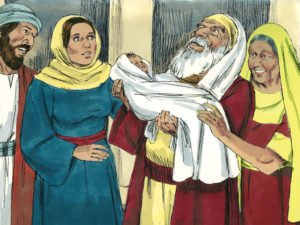

Here we have an example of people in older age who experienced fulfilment in later life. They had always lived lives of service but it was very much in their later years all that they hoped for came to pass. They always had a vision for serving God, but it wasn’t (only) about serving themselves, more broadly the people of Isarel. Here is an image of people in later life ‘embracing the view’.
I would like to pursue what ‘embracing the view’ might look like in Leeds 2022.
I will draw on the work of Ann Morisy, a Community Theologian who is now retired, and particularly on her book “Borrowing from the future” where she talks about her generation – the so called baby boomers (who of course count as youngsters to the pre-war generation). Ann Morisy writes about the older generation being a pivot generation. For Anna and Simeon it was their generation which pivoted because that was when Christ entered the world.
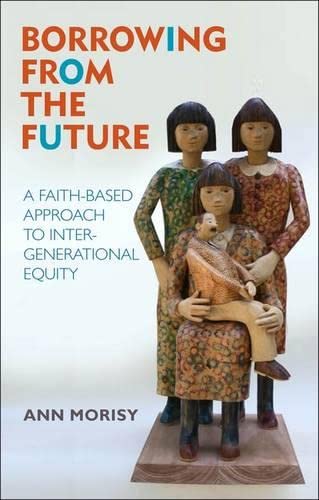

In our different context, what is our pivot point and what are we doing about it?
We face critical questions in our time right now because we are living in ways that are not sustainable. We have had decades of growing consumption and the pursuit of personal fulfilment, and we can’t keep up the pace as we are borrowing from the future.
We do know that our lifestyle isn’t sustainable in ecological terms – we are storing up problems that future generations
will have to contend with.
In addition, we have a pension system and social care system that relies on present contributions being made at every higher levels. Young and old are under pressure and we know that households most likely to be living in poverty are young families.
We are in a really serious position as a society and as a global population – how can the older generation be a pivot generation?
Against this background, we can look honestly at the question of ‘What is the purpose of old age?’ IF we look at the natural world, no other species has females living for decades after they can no longer produce the next generation. This has evolved for a reason.
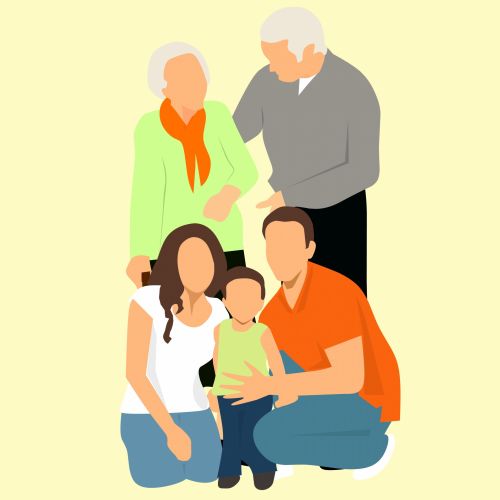

A practical aspect is the contribution that the older generation make to raising the younger generation as they grow and emotionally supporting the middle generation as they work, create and build. I am sure that many of you here today are actively involved in this practical aspect of life. And increasing good health and people having children later in life has altered when ‘old age’ begins.
However, there is another ‘non-practical element that it is worth exploring. The psychologist Piaget identified stages of development from childhood to adulthood as we grow in conscious thought and can plan for the future and work out how to approach tasks and achieve objectives. But there is perhaps a further stage of development when we can live with contradiction and nuance; live with the things that don’t immediately make sense or are contradictory. To find a way to live well with that, to be integrated, in the terminology used in the title of our meeting – when we ’embrace the view’. This is surely a key purpose of older age too – that we can appreciate the importance of context, the relativism of knowledge and how to apply common sense in tricky situations. Of course this is traditionally called wisdom.
So perhaps instead of attempting to extend the middle stage of ‘adulthood’ for as long as possible (60 is the new 40 and so on),a pivot generation can step forward into the age and stage of wisdom without too much regret at leaving behind the so called ‘generative’ stage of adulthood. And what is more – that this isn’t just for themselves, but because it enables people to offer into our society what is so much needed.
A wisdom to challenge the ever increasing consumption that is no good for the planet, no good for the mental health of the younger generations caught up in advertising and having to live ‘amazing lives in their perfect homes with all the tech’ – and failing.


We are living psychologically beyond our means because we believe in limitless self-expansion.
Bringing compassionate wisdom to our current cultural climate at a time in life when people are less inhibited by ‘what people think’; when people can have a greater ability to live in the moment’ (older people do admittedly talk a lot about the past – but not as much as younger people focus on the future); when people are confident enough to acknowledge dependencies and needs – and our interdependencies.
Older age is a time when people are well placed to actively seek to foster an interest in ‘higher’ things and concern for others.
Developing greater abilities to live with uncertainty, relationality and connectedness. What is sometimes called Spiritual Capital – and much needed in our society facing economic and ecological challenges.
So if that is the purpose of older age – what is the purpose of faith in this? To live well in the light of an economy where those most in poverty are young working families – and in the light of climate catastrophe, is surely to live for others. Not passing on the problems to unborn generations, but acting now.
Faith communities have a long tradition of helping people to live with an awareness of others. But we have to be aware there has been a time (and for some it continues) when the Church has alienated many older people; at a time when it judged people for being divorced or gay, for example. When people felt the high standards demanded of people were demanded in a way they experienced as emotionally abusive. And that this happened at a time when society at large was opening up to people seeking personal fulfilment, allowing freedoms for single women to look after their babies; for gay people to live an integrated life.
So Ann Morisy calls for second chance theology – that older people give the church another chance. That the Church needs to witness to its greater humility, greater recognition of personal fulfilment as part of God’s plan for people. That the church needs to perhaps talk more about struggle than sin. Still recognising what Jesus achieved on the cross for our salvation. An emphasis on the fact that Jesus was showing us a way to live.
That we are called and resourced by God to live with compassionate intention – and to work out with wisdom what it means to live with compassionate intention in Leeds today.
So, the church needs to be invigorated in its mission among older people. We talk about youth work as the church of the future – well mission among older people is also about the church of the future. In the struggle against consumption, the idea that money is the answer to everything, that we should expect things to always be getting better. Being honest enough to face the fact that over-consumption means that other people have less, including the generations we don’t yet know.


So older people have, with faith, the capacity – the Spiritual Capital – the compassionate intention – to be dissenters in the progress of greater consumption, vital for future generations.
That is the view that we are embracing: It isn’t just a pretty view from the top of a hill in the countryside – it is an honest view of the challenges of our society, the role of faith in that – and a calling to purpose for those in later life – to bring to the situation that which is gifted to them at this later stage of life, to be the pivot generation.
I would recommend Ann Morisy’s book as a way to look at what that might mean in practical and campaigning terms. And I recommend the image of Anna and Simeon as inspiration for embracing the view.
Helen Reid, April 2022
Over the Hill or Embracing the View? Perspectives on Later Life – Gaynor Hammond
A short personal reflection by Gaynor Hammond
Adapted from the Closing Reflection given by Gaynor at our event on 26th April 2022.
When I think about old age, it is still – somewhere over there!!
Till I get my aches and pains, or I hit a brick wall and occasionally the realisation hits that actually I have probably reached it!!
But it can be so hard to accept!
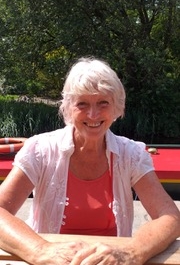

My mind often goes back to the point in my life when I retired from my posts as Regional Tutor for Northern Baptist College and Associate Minister of a large church in Leeds, I was 67 years old.
I decided to join a church near home where I felt I could belong.
I approached the minister of a local church to talk about becoming a member.
The minister was really pleased and said that he knew which House Group would be just right for me. It was in the afternoon because it was for the ‘older ladies.’ It was run by a man we shall call Fred and the group was called ‘Fred’s lovely ladies’ I was assured that they loved it – and I would too! I thought to myself. “Does he know who I am!’ He Did!! Well he didn’t know me very well because he would have known I am not a ‘lovely lady’!!!!
But is that how he now saw me? – an old lady? Well I suppose I was – but!!
Needless to say I didn’t join! But that experience made me wonder if this was the beginning of my decline!
In contrast, at the age of 70, I was ecstatic to be called back into ministry – I felt like Moses!! I was called to be minister of Hope Baptist Church at Hebden Bridge – which I did for nearly 3 years – until a heart condition forced me to lay it down, which literally broke my heart, there was so much left for me to do!!
Where did that leave me? Back in decline? Only God knows.
3 years later and 3 blue light trips to A&E I’m still standing!
I now belong to a little church who don’t ask too much of me but often ask me: ‘Can we just run this past you?… Can you just take a look at this?… Would you just help us with this…?’
So it feels like I am not quite in decline, just on a different stage of the journey. Being offered a different way to serve.
We each have our own story.
What can we say? God hasn’t finished with us yet? And who knows what the future will bring? Maybe part of the wisdom that comes with maturity is the knowledge that we cannot do it all! And actually we never could!


Perhaps aging helps us to get it all in perspective and realise that the work we have done – and the work we still have to do – however small and insignificant it seems, is God’s – what happens to it is in God’s hands not ours.
I would like us to finish by reflecting on some words by Oscar Romero, which I think are so fitting for us today.
It helps now and then to step back and take the long view.
The kingdom is not only beyond our efforts it is even beyond our vision.
We accomplish in our lifetime only a tiny fraction of the magnificent enterprise that is God’s work.
We plant seeds that one day will grow.
We water seeds already planted knowing they hold future promise.
We lay down foundations that will need further development far beyond our capabilities.
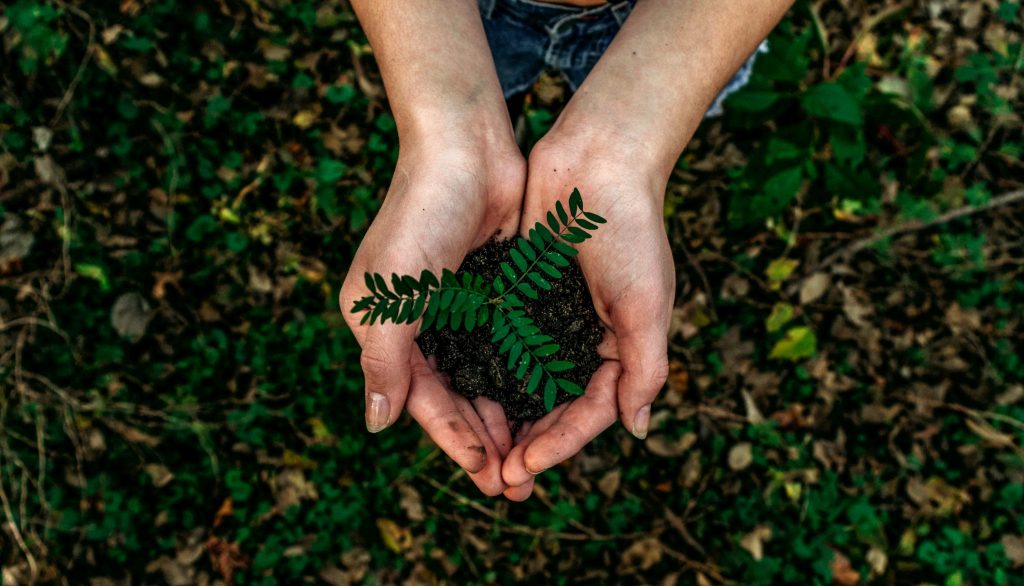


We cannot do everything and there is a sense of liberation in realising that.
This enables us to do something and do it very well.
It may be incomplete, a step along the way, an opportunity for God’s grace to enter and do the rest. We may never see the end results but that is the difference between the master builder and the worker.
Oscar Romero
So whatever stage of life we are at, what a privilege to be a part – even a small part – of building God’s kingdom here on earth – because there is still an adventure to be had – and God hasn’t finished with us yet!
Blessing from the Northumbria Community
'May the peace of the Lord Christ go with you, Wherever he may send you May he guide you through the wilderness, Protect you through the storm May he bring you home rejoicing At the wonders he has shown you May he bring you home rejoicing Once again into our doors.'
Gaynor Hammond, April 2022
Living and Dying Well – some useful websites and books
As we are not able to run the conference at this time, we thought we would remind you of some useful websites and books on the topics of living and dying well. We hope you benefit greatly from exploring this content.
Useful Websites for your perusal:
The Art of Dying Well: https://www.artofdyingwell.org/
This excellent website based on an ancient Catholic tradition called Ars Moriendi offers practical and spiritual support to anyone faced with the prospect of death and dying, including helpful articles and videos.
Christians on Ageing: https://christiansonageing.org.uk/
A resource for churches: a voice for older people and their life of faith and hope. Interesting articles and up to date news.
Dying Matters: https://www.dyingmatters.org/
Well known website and movement to help people talk openly about dying, death and bereavement.
Sue Ryder: https://www.sueryder.org/
Scroll down on the home page to find their useful publication ‘A Better Death’.
A few recommended books for further reading:
If you click on the title it will take you to where you can read more about the book or purchase it if you wish.
Between Living and Dying: Voices from the Edge of Experience – Ruth Scott
Dear Life: A Doctor’s story of Love and Loss – Rachel Clarke
With the End in Mind: How to Live and Die Well– Kathryn Mannix
The Gift of Years: Growing Older Gracefully – Joan Chittister
God, Me and Being Very Old – Keith Albans and Malcolm Johnson
“I have a dream” by Ann West
Ann West, a trustee, writes “I have a dream that one day, older people will not have to sky dive, run marathons, complete a bucket list, rely on cosmetic surgery , or Viagra, in order to be admired, valued or just to keep up.”
You can read more about Ann’s dream here I have a dream by Ann West


The finished performance will be printed for an international conference on active ageing in November 2017…. and then, who knows?

